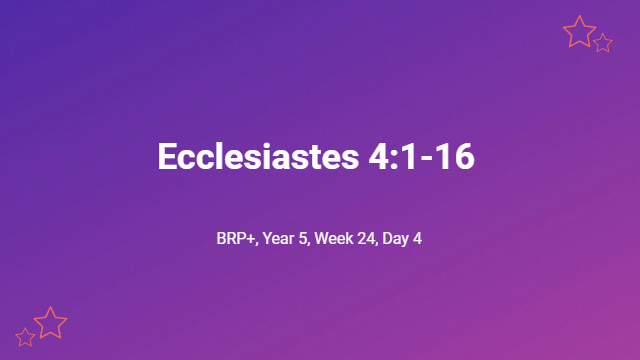Ecclesiastes 4:1-16
Q.1. Is comfort available to the oppressed and the oppressors? What was Solomon’s observation and conclusion about labour and hard work? – (Ecc.4:1-8)
Solomon had the unique opportunity of looking at both sides of the ledger. He saw the plight of the oppressed – that they had no one to comfort them (Ecc.4:1). However, even on the side of the oppressor with all the power – they had no one to comfort them either (Ecc.4:1). He saw the lot of the labourer, and also that of the boss. Both experienced rivalry and frustration on their life’s journey. In fact, Solomon considered that those without responsibility were better off than those pressured by deadlines and quotas (Ecc.4:4-6). He concluded that it is easier for the dead than for the living … and that those who never existed were to be envied (Ecc.4:2-3). The observation of oppression and hard labour led Solomon to conclude that viewing life from man’s point of view – … is vanity and striving after wind (Ecc.4:4 c.f. Ecc.4:6).
Q.2. What are the perils of going it alone? What are the benefits of companionship? What are the hazards of power and promotion? – (Ecc.5:9-16)
God had given Solomon wisdom to be able to stand back and consider how people do life. He observed a man who deprived himself to amass a fortune, even though he had no dependents to whom to pass it on. He soon realized that it was better to have a companion to share life with, and thus double our returns and blessings, and halve our trouble and strife – 9 Two are better than one because they have a good return for their labour. 10 For if either of them falls, the one will lift up his companion. But woe to the one who falls when there is not another to lift him up. 11 Furthermore, if two lie down together they keep warm, but how can one be warm alone? 12 And if one can overpower him who is alone, two can resist him. A cord of three strands is not quickly torn apart (Ecc.4:9-12). Solomon also observed that leadership can become half hearted. He saw that leaders can rest on their laurels and grow complacent about their responsibilities. The longer people stay in power, the more they may be corrupted by this power, and may resist change (Ecc.4:13-16).

